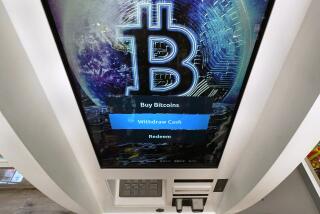Bitcoin ATM builder takes aim at traditional financial services
In a makeshift office — a living room crowded with desks, monitors and a beanbag chair — a handful of programmers are hacking away on computers, aiming to make their mark on the multibillion-dollar financial services industry.
This condo on the 19th floor of a trendy high-rise in the heart of downtown is the headquarters of Robocoin, the maker of automated teller machines that turn bitcoins, the growing virtual currency, into hard cash. The bitcoin ATMs, in the view of the start-up’s founder, would challenge traditional money transfer services such as Western Union.
“I regard the financial system in general and the players in that as our competitor,” said John Russell, the 25-year-old founder of Robocoin. “Western Union is on our cross hairs big-time.... The process of wire transfers, international wire transfers — we’re going to smash them, we’re going to crush them. We’re going to totally disrupt that environment, and that’s what I’m most excited about.”
Since it was created four years ago, the bitcoin virtual currency has primarily existed online, its use mostly limited to shopping or speculators trading it like a stock.
But with Robocoin ATMs — there are now 30 around the world — consumers can buy bitcoins or exchange them for dollars or euros, creating an easy way for bitcoin owners to get cash to buy products and services.
With the underlying infrastructure now mostly in place, investors and analysts say bitcoin ATM expansion is imminent — 600 or more machines are projected to be installed in the next six months, and investors are poised to pump millions into the growing handful of companies that produce and sell the ATMs throughout the world.
Though the technology behind bitcoins and other digital currencies is complex, most mainstream bitcoin companies are working to make the experience simpler for consumers. Users can go to a website like https://www.coinbase.com or to a bitcoin ATM, create an account and buy bitcoins with dollars.
Bitcoin ATMs allow users to buy bitcoins with cash and sell bitcoins for cash, which is attractive for users trying to stay anonymous. They compete against a cottage industry of brokers who operate bitcoin exchanges.
Russell, who founded the company with his brother Mark Russell, was inspired to start Robocoin after the two found that going through a broker was highly inefficient.
“One of my favorite quotes is ‘Never send a human to do a machine’s job,’” he said, quoting from the 1999 sci-fi film “The Matrix.”
John Russell first learned about bitcoins as a member of an undergraduate libertarian group at the University of Nevada, Reno. There, he focused largely on libertarian-centered activism, founding a group focused on dismantling the student government and filming midnight arrests of drunk freshmen in the hopes of catching potential police abuses.
Despite his political views, Russell said bitcoin use isn’t only for tech nerds or fans of libertarian novelist Ayn Rand.
“Bitcoin is apolitical,” he said. “It’s a [software] protocol, it’s no different than HTTP. How you want to interpret that or the implications of that are for the political scientists and the academics among the community.”
The federal government’s highly publicized raid on the online illegal drug market Silk Road in October 2013 was for many outside the bitcoin world the first glimpse into the currency’s potential to circumvent traditional financial institutions. Investigators estimated that nearly $1.2 billion worth of transactions were conducted on Silk Road, entirely in bitcoins.
The current market cap for bitcoin based on current prices is around $7.8 billion in U.S. dollars, with more than 2,700 transactions per hour.
Bitcoins’ rapid growth is what has investors like venture capitalist Jeremy Liew excited about its future. Liew, one of the first investors in Snapchat, has invested several million dollars into a number of bitcoin companies, including OpenCoin and BTC China.
“I think it’s far from certain that bitcoin will be as widely accepted as American Express, but if it is, the disruption that it will create will be enormous,” Liew said.
But Jerry Brito, an early bitcoin adopter and director of George Mason University’s Technology Policy Program, said it’s not likely that bitcoins will come to replace government-controlled currencies like the dollar, and will most likely operate concurrently with existing financial institutions in the future.
“I’ve always been not totally convinced by the argument that bitcoin is going to stand apart from banks,” Brito said. “Bitcoin standing apart as a fiat currency doesn’t make sense to me.”
Instead, bitcoins will fill several niche uses that the current financial system isn’t adequately addressing, he said. Lacking high payment fees, bitcoins can be a more effective system for individual international micropayments or for online retailers to attract more sales from regions that aren’t served by financial giants.
In that scenario, a worker without a traditional bank account will be able to put dollars into a bitcoin ATM, then give a family member in another country a code or password to access the account. Once the family members go to a machine in their country, they’ll be able to withdraw that bitcoin into any sort of cash — essentially using bitcoin as the middleman in an international money transfer.
In the U.S., bitcoin ATM companies are designing compliant technology to deal with future regulations that may require more data or information from users, to make it harder to launder money.
Brock Pierce, a distributor and operator of several Robocoin machines in Los Angeles and Asia, said the company’s palm vein scanner technology and its ability to quickly adapt to new laws are what attracted him.
“They built a machine that could withstand future regulations,” he said.
Amid the rapid growth of its ATMs, Robocoin is planning to move from its current work space to a more traditional setting for technology companies near San Francisco.
Chief Executive Jordan Kelley said he’s beginning to get attention from investors to continue expansion, but it’s challenging to build a bitcoin-based technology when consumers have difficulty understanding how the currency works.
“It’s not easy to comprehend this yet,” he said. “That’s the challenge. That’s what we have to do as a company.”






